Projector
Monitor
Lighting
Digital Display
Job References
The SW270C monitor from BenQ offers a great mid-range option for photography and video professionals. It’s been available for some time and personally I wasn’t in a rush to get it as I wanted to be responsible and learn more about its capabilities. I also planned to get some hands-on experience with it and put it to practical use before committing. That’s because to my mind, good monitors should be fairly straightforward and not burdened with overly-fancy features that I don’t really need. The essential qualities and foundations count much more towards making a monitor good for my work. As for the SW270C, I quickly found out that it provides reliable performance and has everything I need out of a monitor, including a design that reduces eye strain and fatigue even during the longest editing sessions.
When I was sorting out old photos recently, I found a photo taken in Tibet about seven or eight years ago. When I viewed the original RAW format photo on my old laptop screen, it was almost totally dark and basically useless. But still, I didn’t want to delete that photo for different reasons, so I kept it. When shown on the SW270C, details in the image popped out with obvious clarity, even in parts of the shot that appeared completely darkened on my laptop screen. Color gradations re-emerged, and I was convinced the SW270C did good justice to the depth of RAW files. To me that’s very important, as with RAW images photographers have a lot of room for adjustment and retrieval of additional details in post production. Naturally, a screen able to depict those deeper nuances with a high degree of fidelity is needed.
Thanks to the SW270C, I was able to work on the old Tibet image and restore it.
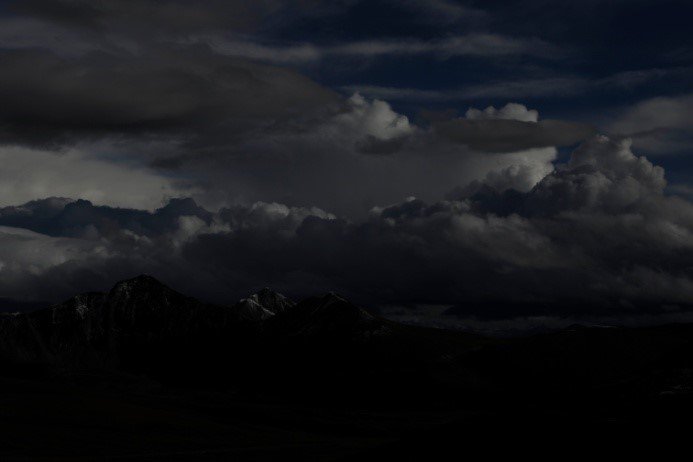
Original RAW image on laptop screen appears too dark, details obscured
The results I got with the Tibet image far exceeded my expectations. In effect the SW270C gave an old but classic and important work of art new hope and a new life by allowing me to work on its restoration. Without the SW270C I’d have likely given up on the image and discarded it, which would have been a great shame. So, the SW270C clearly provides photographers and image editors with better representation of image information, details, gradations, and stereoscopics. With all of those available to professionals, photography and video projects become both easier and more accurate, improved by effortless image parameter adjustments and color setting customization.

Same image after adjustment as seen on the SW270C
The SW270C belongs to BenQ’s range of photography monitors, a series that over the years has matured and continues to offer innovative products. Staples of the series include wide color gamut (WDC), professional factory calibration, DCI P3 support, HDR10, and assured screen uniformity. BenQ have implemented a redesigned OSD that feels wonderful to use and delivers improved response and convenience compared to models from other brands.
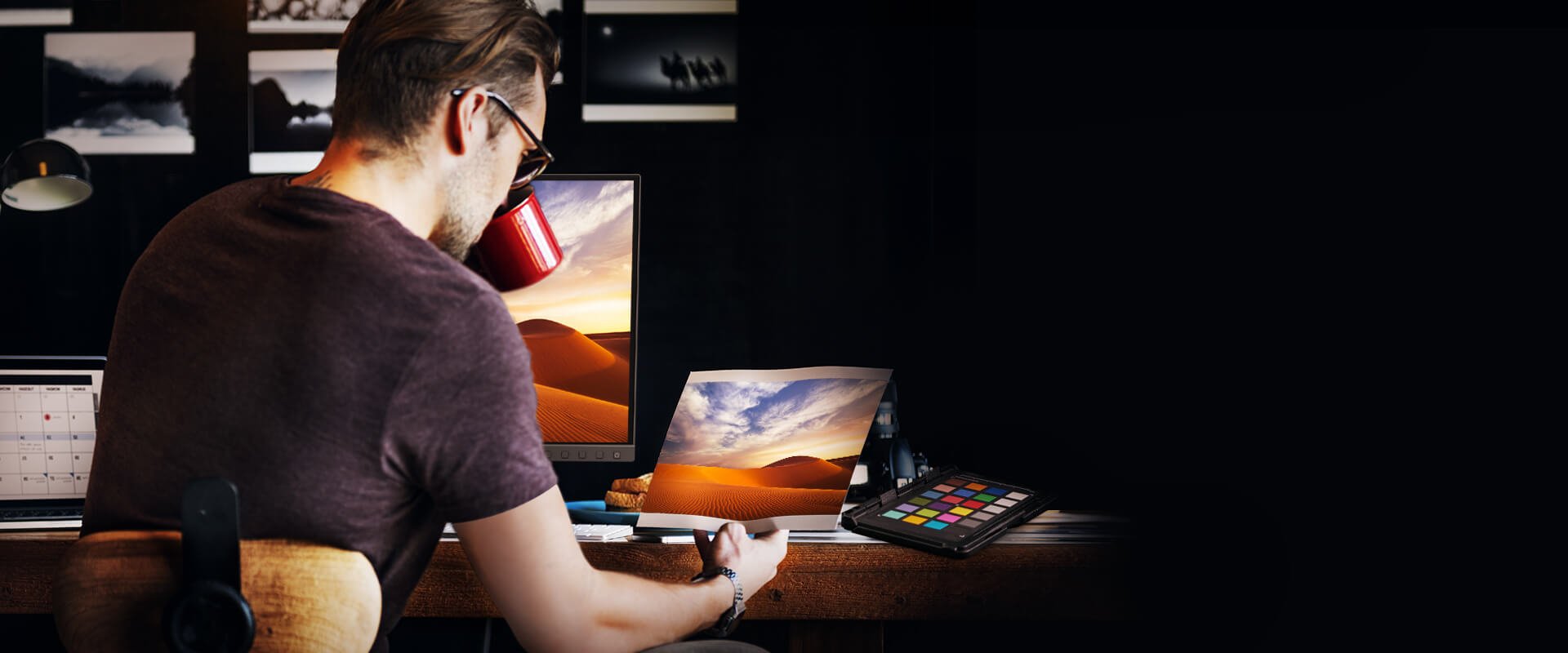
Masterful color precision on the BenQ SW270C monitor for photographers
One major difference between the SW270C and certain competing models is compatibility. As you know, we use different kinds of displays on a daily basis, the most common types being mobile phones, tablets, cameras, computers, and TVs. Each has its own color space, while gamut varies by model and application. For example, sRGB works just fine for word processing and internet browsing while photo editing and printing demand the more comprehensive color range of Adobe RGB. Video editors routinely choose the most advanced color settings via DCI P3 and SMPTE Rec. 709.
Therefore, when viewing images on different monitors there may be significant divergence in color. In order to prevent unwanted color variations when working on content and maintain as faithful a reproduction as possible, it is essential to have a monitor that fully supports different color spaces. The BenQ SW270C does exactly that. Its color gamut covers 99% Adobe RGB, 97% movie-level DCI P3/Display P3, and true 100% sRGB plus Rec. 709, which are commonly used in TV broadcasting. The monitor provides professional and accurate color representation for images and video.
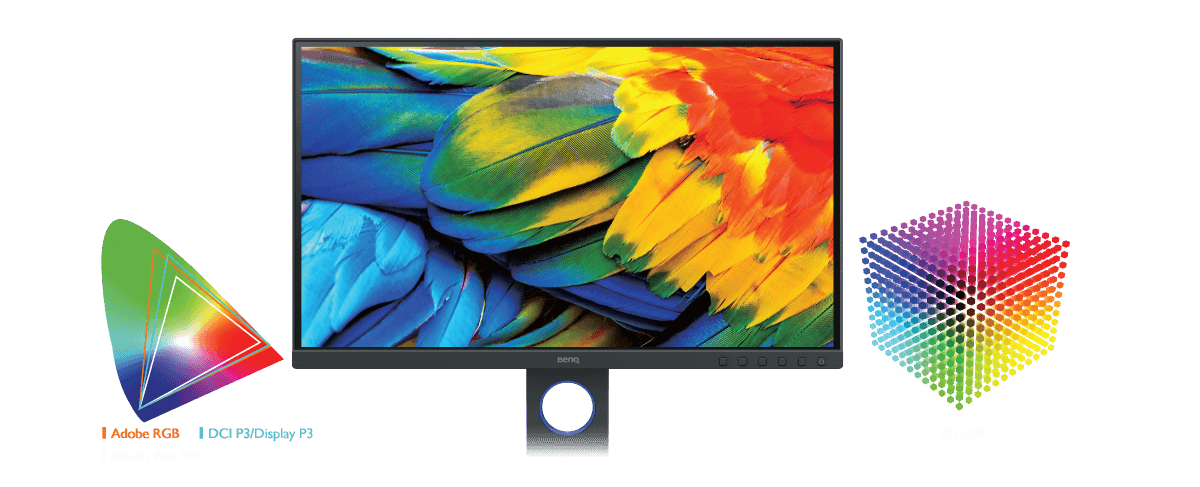
Extensive wide color gamut support accommodates different applications
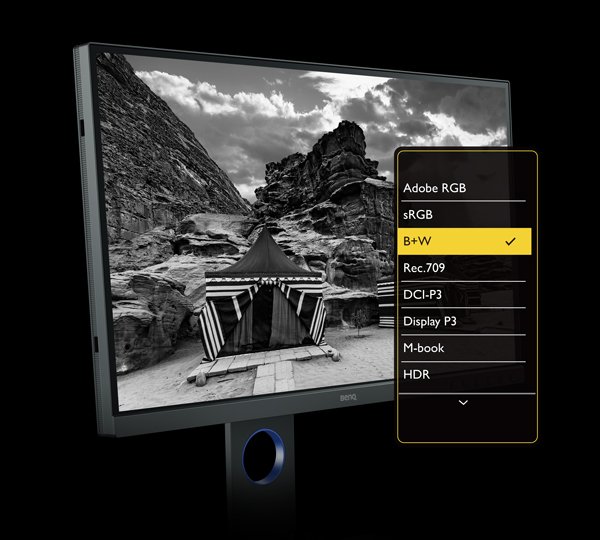
Comprehensive BenQ SW270C color mode options
When it comes to movies, we live in era where many people are keen on producing short videos and vlogs. And looking at video producers, most dream of eventually graduating into big time directors whose works are seen by many. While the path to glory and success may be unpredictable, a good professional monitor certainly helps. As a platform for faithful reproduction and editing, the SW270C brings colors to life to make sure what you edit is what you get and that your vision retains its integrity. In that area the SW270C exceeds most competitors and certainly monitors from previous generations. Take DCI P3 as an example. It’s gradually becoming the color standard for digital video, with roughly 25% wider color gamut than sRGB. DCI P3 green and red spectrums are particularly wider. Hence, video editors and film professionals need a monitor that supports DCI P3 so content tonality and details appear as faithful as possible and effectively just as they would on the big screen.
In addition to DCI P3, Display P3, and Rec 709, the SW270C also supports HDR10, allowing pros to work with HDR content natively in a lossless fashion. It’s further compatible with 24FPS/25FPS video. The SW270C’s versatility continues with an included USB-C port, SD card reader, and a premium 60W power supply. All of these mean the SW270C acts as a perfect enabler of forward-thinking photographers and videographers, or anyone wishing to move from photography into bigger scale video production.
It is worth mentioning that the SW270C features new screen color uniformity technology. It utilizes high precision algorithms and components to meticulously fine-tune brightness and color temperature at hundreds of display sub-regions that cover every pixel on the screen. Advanced uniformity maintenance reduces color temperature inconsistencies between different areas of the screen, most notably between the center and edges. Light leakage often causes color misalignment most commonly seen close to the corners of a screen, but the SW270C with its uniformity technology prevents that from affecting the work of professionals by implementing precision correction and uniformity enforcement.


Brand new monitor brightness and color temperature uniformity technology
The SW270C also boasts the latest iteration of BenQ AQCOLOR technology, designed by the industry’s top-level color experts with “Precision to Reproduce” as their guiding principle. AQCOLOR meets ICC (International Color Consortium) and ISO (International Standards Organization) color-related standards. Precise colors on screen mean photos and videos look natural and as captured, without distortion or compromise. The SW270C not only supports top-tier professional calibration by techs or users, it ships fully calibrated from the factory so you can get started right away with confidence. You don’t have to spend time messing with calibration unless you really want to. The SW270C also offers a hardware 16-bit 3D LUT (look up table) for storing complex calibration values on the monitor itself. With all of these assets, users get the most out of RGB color blending and the 10-bit panel the SW270C monitor uses. Content renders naturally and accurately, plus color variance between sources is minimized or outright eliminated.
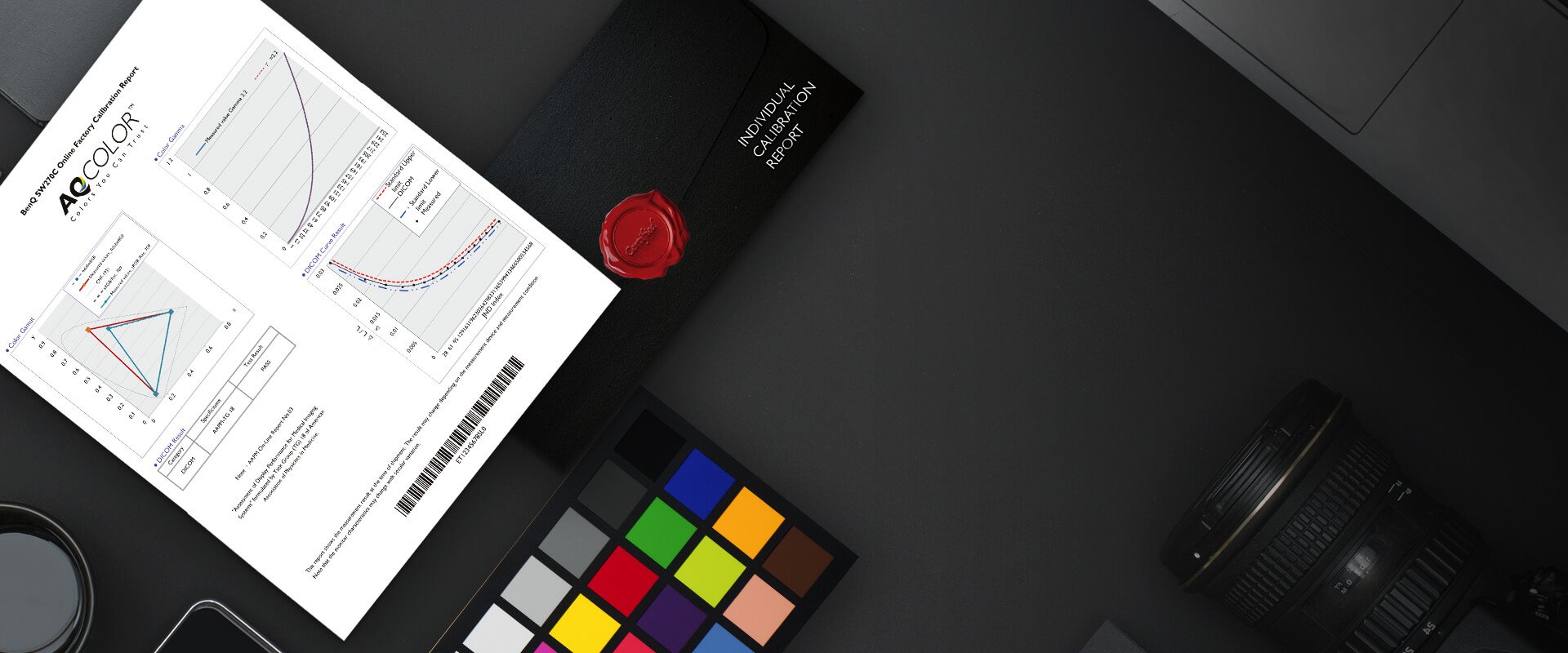
Accurate out of the box: factory color calibration and delta E of less than 2
Color reproduction precision is usually described using delta E values. Most consumer LCD displays on the market manage a precision level measured in the delta E 6.5 to 13 range. With its 1.07 billion colors, the 10-bit SW270C panel maintains a delta E value lower than 2, meaning it’s between two and seven times more accurate than your average LCD screen. Delta E values are widely accepted as a reference by image and video professionals, with lower delta E describing results that are closer to the original. A value of zero would mean no difference from the original image or video source in terms of color. The overall BenQ SW series averages a delta E of 0.6, or very near zero. While SW270C specifications officially state a delta E of less than 2, you can expect even more precise color in actual usage.
While nominally a mid-range offering within the overall BenQ SW series, the SW270C actually comes in as an optimized and streamlined version of the high-end SW2700PT model. Certain features have been simplified or replaced based on feedback from professionals looking for a great value monitor to work on. Many features from pricier monitors have been included, such as picture in picture, HDR, SD card reader, and USB-C. Also, real world image performance has been augmented compared to previous models from BenQ that occupied the same market position, and certainly next to existing competitors.
Users should especially appreciate the SW270C’s new look with its extra thin bezel and redesigned OSD for improved ease of use and comfort. It’s a lot more intuitive than many other offerings, making advanced features readily accessible. Other highlights of note are the sturdy base, support for numerous mounting options, and reduced product weight. Then of course there’s the user control interface.
Serving as the debut model for this feature, the SW270C uses an upgraded second-generation external control Hotkey Puck. This metal-textured control knob provides intuitive access to brightness, volume, contrast, and other screen parameter adjustments. There are also three custom buttons enabling users to switch color mode and signal source with one button. For photography enthusiasts, the most useful must be quickly switching between Adobe RGB, sRGB, and black and white modes. The Hotkey Puck, so named because it looks like a hockey puck (notice the word play?), represents the commitment by BenQ to developing the finest monitors for image professionals, complete with exclusive technologies and features.
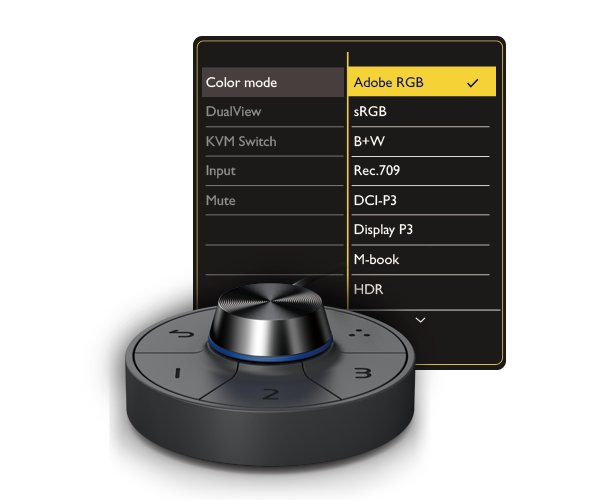
Second generation Hotkey Puck makes hands-on monitor control sleek and cool
Macro Photographer / China
As the lecturer of post-processing and macro photography, Xue is a trainer for colleges and companies. As a professional photographer, Xue has won many photography contests and been the judge for many design and photography contests.

●Uniformity Technology for Screen-Wide Color Accuracy
●99% Adobe RGB Color Space with IPS Technology
●USB-C Connectivity with Power Delivery